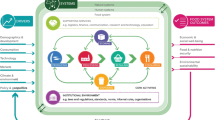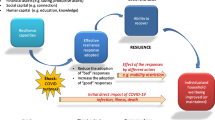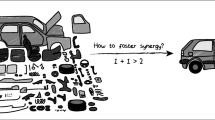Abstract
Food is produced, processed, packaged, transported, and sold in a stable, organized system or food regime. The current food regime is focused on calories empty of substantial nutrition designed primarily for the growth of capital and corporate power, fostered through the lax, often corporate-designed, regulatory environment of neoliberalism. The neoliberal food regime is responsible for systemic malnutrition and erosion of the ecological preconditions for food production, as a regularity of the system itself. Consequently, a main line of food vulnerability is the political system that insulates the current food regime from social forces demanding change. This insecurity is contrary to the public or larger human interest, but this unsustainable system remains in place through a stable arrangement of government prescriptions that follow corporate-elite interests. To understand this structural problem, this essay examines the power of the food industry which requires the manufactured consent of civil society. The paper finds that counter-revolutionary efforts, which are anticipatory and reactive efforts that defend and protect capitalist elite from social change, stabilize the neoliberal food regime through covert tactics meant to undermine public interest critics and activists. As a result of these elite-led interventions, true civil society has become less powerful to articulate a public interest that might otherwise intercede in the operation and structure of the food regime. Thus, one leverage point in this political problem is the capacity of civil society, once it is independent of corporate interests, to remove consent to an abusive system and to debate and demand a food system that neither systematically starves whole groups of people nor destroys the ecological systems that make food possible. Building food security, then, requires recapturing a semi-autonomous civil society and eliminating domination of the corporate elite and replacing it with politics aligned with a public and ecological affinity. Scholars, educators, and the public can reduce the food vulnerability by becoming aware of corporate interests and creating strategic alliances to form a new system with more humane and ecological priorities.
Similar content being viewed by others
Notes
The author is grateful to Gerry Marten and Nurcan Atalan-Helicke for their constant and thorough guidance and to the four anonymous reviewers through two rounds who helped improve the theoretical clarity of the article.
This paper will use the three-volume complete set of Prison Notebooks compiled by Joseph A. Buttigieg. These essays are highly fragmented, and following any one concept in these volumes across Gramsci’s writing is difficult, but using the complete Notebooks allows for reading the full context of the notes as opposed to edited selections.
References
Alkon AH, Agyeman J (2011) Cultivating food justice: race, class, and sustainability. MIT
Andrée P (2005) The genetic engineering revolution in agriculture and food: strategies of the ‘biotech bloc’. In: Levy DL, Newell PJ (eds) The business of global environmental governance. MIT, Cambridge, pp 135–166
ASPCA (2015) Ag-gag bills at the state level. American Society for Prevention of Cruelty to Animals. https://www.aspca.org/fight-cruelty/advocacy-center/ag-gag-whistleblower-suppression-legislation/ag-gag-bills-state-level.
Bhuyan S (2000) Corporate political activities and oligopoly welfare loss. Rev Ind Organ 17(4):411–426. doi:10.1023/A:1007843812053
Buttel FH (2001) Some reflections on late twentieth century agrarian political economy. Soc Ruralis 41(2):165–181
Carlson C (2012) The ag gag laws: hiding factory farm abuses from public scrutiny. Atlantic 20
Carolan MS (2013) Reclaiming food security. Earthscan Food and Agriculture. Earthscan/Routledge, London
Carpenter SR, Stanley EH, Vander Zanden MJ (2011) State of the world’s freshwater ecosystems: physical, chemical, and biological changes. Annu Rev Environ Resour 36(1):75–99. doi:10.1146/annurev-environ-021810-094524
Carroll WK (2009) Transnationalists and national networkers in the global corporate elite. Global Networks 9(3):289–314. doi:10.1111/j.1471-0374.2008.00255.x
Centeno MA, Cohen JN (2012) The arc of neoliberalism. Annu Rev Sociol 38(1):317–340. doi:10.1146/annurev-soc-081309-150235
Center for Consumer Freedom (2014) CCF warns congress not to fall for propaganda. https://www.consumerfreedom.com/print-ad/ccf-warns-congress-not-to-fall-for-propaganda/. Accessed 25 Nov 2014
Clapp J, Helleiner E (2012) Troubled futures? The global food crisis and the politics of agricultural derivatives regulation. Rev Int Polit Econ 19(2):181–207
Coleman-Jensen A, Nord M, Andrews M, Carlson S (2011) Household food security in the United States in 2010. USDA-ERS Economic Research Report (125)
Conway GR, Pretty JN (2013) Unwelcome harvest: agriculture and pollution. Routledge, New York
Corson C (2010) Shifting environmental governance in a neoliberal world: US AID for conservation. Antipode 42(3):576–602. doi:10.1111/j.1467-8330.2010.00764.x
Dauvergne P, LeBaron G (2014) Protest Inc.: the corporatization of activism. Wiley
Day RJF (2005) Gramsci is dead: anarchist currents in the newest social movements. Pluto, London
Dirzo R, Raven PH (2003) Global state of biodiversity and loss. Annu Rev Environ Resour 28(1):137–167. doi:10.1146/annurev.energy.28.050302.105532
Evans W (2008) Profile: coalition for a democratic workplace. National Public Radio. Retrieved from http://www.npr.org/templates/story/story.php?storyId=94399074. Accessed 25 June 2015
Friedmann H (1982) The political economy of food: the rise and fall of the postwar international food order. Amer J Sociol 88 (article type: research article/issue title: Supplement: Marxist inquiries: studies of labor, class, and states/full publication date: 1982/Copyright © 1982. The University of Chicago Press):S248-S286. doi: 10.2307/3083245
Friedmann H (1992) Distance and durability: shaky foundations of the world food economy. Third World Q 13(2):371–383
Gramsci A (2011) Prison notebooks. vol 1-3, Paperback edn. Columbia University Press, New York
Greenhouse S (2014) Advocates for workers raise the ire of business. The New York Times, January 17, 2014, p B1
Harvey D (2005) A brief history of neoliberalism. Oxford University Press, Oxford
Holt-giménez E (2008) Out of AGRA: the green revolution returns to Africa. Development 51(4):464–471. doi:10.1057/dev.2008.49
Howard PH (2009) Visualizing consolidation in the global seed industry: 1996–2008. Sustainability 1(4):1266–1287
Indigenous Peoples Global Conference On Rio+20 and Mother Earth (2012) Kari-Oca 2 Declaration. Rio de Janeiro, Brazil
Ingram J, Ericksen P, Liverman D (eds) (2010) Food security and global environmental change. Earthscan, London
Jacobs D (2014) Rising income inequality in the US was fuelled by Ronald Reagan’s attacks on union strength, and continued by Bill Clinton’s financial deregulation. LSE American Politics and Policy
Jacques PJ (2006) The rearguard of modernity: environmental skepticism as a struggle of citizenship. Global Environ Polit 6(1):76–101
Jacques PJ (2009) Environmental skepticism: ecology, power, and public life. Global Environmental Governance. Ashgate Publishing Ltd., Burlington; Surrey
Jacques P (2015) Sustainability: the basics. Routledge, New York
Jacques PJ, Dunlap RE, Freeman M (2008) The organization of denial: conservative think tanks and environmental scepticism. Environ Polit 17(3):349–385
Kim CS, Hallahan C, Schaible G, Schluter G (2001) Economic analysis of the changing structure of the U.S. flour milling industry. Agribusiness 17(1):161–171. doi:10.1002/1520-6297(200124)17:1<161::aid-agr1008>3.0.co;2-0
Kokic P, Crimp S, Howden M (2014) A probabilistic analysis of human influence on recent record global mean temperature changes. Climate Risk Manage 3:1–12. doi:10.1016/j.crm.2014.03.002
Landfried J (2012) Bound & gagged: potential first amendment challenges to ag-gag laws. Duke Envtl L Pol’y F 23:377
Levy DL, Newell PJ (2005) A neo-Gramscian approach to business in international environmental politics: an interdisciplinary, multilevel framework. In: Levy DL, Newell PJ (eds) The business of global environmental governance. MIT, Cambridge, pp 47–69
Lipton E (2014) Hard-nosed advice from veteran lobbyist: ‘win ugly or lose pretty’: Richard Berman energy industry talk secretly taped. NY Times 31:A19
Lukes S (1974) Power: a radical view. Macmillan, London
Maniates MF (2001) Individualization: plant a tree, buy a bike, save the world? Global Environ Polit 1(3):31–52. doi:10.1162/152638001316881395
Marcuse H (1972) Counterrevolution & revolt. Beacon, New York
Mayer CE, Joyce A (2005) The escalating obesity wars: nonprofit’s tactics, funding sources spark controversy. The Washington Post
McMichael P (2005) Global development and the corporate food regime. Res Rural Sociol Dev 11:265–299
McMichael P (2009a) A food regime analysis of the ‘world food crisis’. Agr Human Values 26(4):281–295. doi:10.1007/s10460-009-9218-5
McMichael P (2009b) A food regime genealogy. J Peasant Stud 36(1):139–169. doi:10.1080/03066150902820354
Milanovic B (2011) Worlds apart: measuring international and global inequality. Princeton University Press, Princeton
Moss M (2015) U.S. research lab lets livestock suffer in quest for profit. The New York Times, January 20, 2015, pp A1, A12, A13
Mushita A, Thompson C (2007) Biopiracy of biodiversity: global exchange as enclosure. Africa World Press, Inc., Trenton
Nestle M (2013) Food politics: how the food industry influences nutrition and health. 10th Anniversary Edition edn. University of California Press, Berkeley
Pechlaner G, Otero G (2010) The neoliberal food regime: neoregulation and the new division of labor in North America. Rural Sociol 75(2):179–208. doi:10.1111/j.1549-0831.2009.00006.x
Pijl K (1989) Ruling classes, hegemony, and the state system: theoretical and historical considerations. Int J Polit Econ 19(3):7–35. doi:10.2307/40470522
Piketty T (2014) Capital in the twenty-first century (trans: Goldhammer A). The Bellnap Press of Harvard University Press, Cambridge
Piketty T, Saez E (2013) Top incomes and the great recession: recent evolutions and policy implications. IMF Econ Rev 61(3):456–478. doi:10.1057/imfer.2013.14
Piketty T, Saez E (2014) Inequality in the long run. Science 344(6186):838–843. doi:10.1126/science.1251936
Putnam RD (2000) Bowling alone: the collapse and revival of American community. Simon and Schuster, New York
Ridgeway S, Jacques P (2013) The power of the talking stick: indigenous politics and the world ecological crisis. Paradigm, Boulder
Robbins P (2007) Lawn people: how grasses, weeds, and chemicals make us who we are. Temple University Press, Philadelphia
Robertson GP, Vitousek PM (2009) Nitrogen in agriculture: balancing the cost of an essential resource. Annu Rev Environ Resour 34(1):97–125. doi:10.1146/annurev.environ.032108.105046
Rogers RT (2001) Structural change in U.S. food manufacturing, 1958–1997. Agribusiness 17(1):3–32. doi:10.1002/1520-6297(200124)17:1<3::aid-agr1001>3.0.co;2-1
Ruggie JG (1982) International regimes, transactions, and change: embedded liberalism in the postwar economic order. Int Organ 36(2):379–415
Sareen A (2014) Animal rights and the erosion of the first amendment: AETA, ag-gag and why you should care. Huffington Post
Scholte JA (2013) Civil society and financial markets: what is not happening and why. J Civ Soc 9(2):129–147. doi:10.1080/17448689.2013.788925
Schroeter JR (1990) Measuring market power in food-processing industries: discussion. Am J Agric Econ 72(5):1227–1229. doi:10.2307/1242537
Stuckler D, Nestle M (2012) Big food, food systems, and global health. PLoS Med 9(6):e1001242. doi:10.1371/journal.pmed.1001242
Sutherland B (2015) Monsanto-Syngenta mega-merger would drive more deals: real M&A. Bloomberg Business News
Thompson CB (2014) Philanthrocapitalism: appropriation of Africa’s genetic wealth. Rev African Polit Econ 41(141):389–405. doi:10.1080/03056244.2014.901946
UN Food an Agriculture Organisation, International Fund for Agricultural Development (2014) The state of food insecurity in the world 2014. Strengthening the enabling environment for food security and nutrition. FAO Rome, Italy
van der Pijl K, Yurchenko Y (2014) Neoliberal entrenchment of North Atlantic capital. From Corporate self-regulation to state capture. New Polit Economy 1-23. doi: 10.1080/13563467.2014.923827
Walker ET (2014) Grassroots for hire: the reshaping of participation and policy. Cambridge University Press, Cambridge
Ward CE (1988) Meatpacking competition and pricing. Research Institute on Livestock Pricing, Blacksburg
Werkheiser I, Noll S (2014) From food justice to a tool of the status quo: three sub-movements within local food. J Agr Environ Eth 27(2):201–210. doi:10.1007/s10806-013-9459-6
Yang D, Kanae S, Oki T, Koike T, Musiake K (2003) Global potential soil erosion with reference to land use and climate changes. HyPr 17(14):2913–2928
Author information
Authors and Affiliations
Corresponding author
Rights and permissions
About this article
Cite this article
Jacques, P.J. Civil society, corporate power, and food security: counter-revolutionary efforts that limit social change. J Environ Stud Sci 5, 432–444 (2015). https://doi.org/10.1007/s13412-015-0294-0
Published:
Issue Date:
DOI: https://doi.org/10.1007/s13412-015-0294-0




